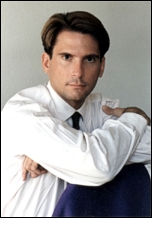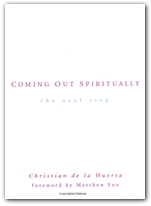|
 By
Christian de la Huerta: First of all,
let me be very clear in stating that I am
aware that the most important priority of
this conference is—and should be—the
creation of a United Religions working
together towards world peace. That is why
I'm here. However, there is another
reason I'm here, and I would not be true to
myself if I didn't take this time to address
an issue which I feel needs to be
acknowledged in this conversation. By
Christian de la Huerta: First of all,
let me be very clear in stating that I am
aware that the most important priority of
this conference is—and should be—the
creation of a United Religions working
together towards world peace. That is why
I'm here. However, there is another
reason I'm here, and I would not be true to
myself if I didn't take this time to address
an issue which I feel needs to be
acknowledged in this conversation.
Just a couple of days ago, I was told a
story about the Buenos Aires Regional
Conference which preceded this Global
Summit. In one of the small group processes
striving to design the mission and values of
a United Religions charter, a discussion
ensued about tolerance—about who should or
should not be included in a United
Religions. As the participants came back
together for the large group reports, the
elected speaker, a minister from the
Metropolitan Community Church in Buenos
Aires, reported that his group had reached
consensus that no one should be excluded
because of their faith, their ethnicity,
their national origin, their gender, their
age, their political beliefs, etc. In fact,
there was only one area where they had been
unable to reach agreement—and that was
sexual orientation. He then handed the
microphone to another representative from
their group, who stood up and said that his
religion did not allow him to entertain that
possibility, but that in discussing it, his
mind had been expanded and now had new
material to consider.
I think that's great, even hopeful, but
from my perspective, it's just not good
enough. I am here as an unofficial
ambassador from a tribe of people belonging
to every culture and faith in the world —
people who share a love for others of the
same sex —those who in the West call
ourselves, gay, lesbian, bisexual, or
simply, queer. There isn't another group of
people in this world which has been, and
continues to be, as universally maligned, as
universally repudiated, as universally
excluded, as universally condemned, as
universally excommunicated, and yes, even
eliminated by some of the religions of the
world.
The ironic, and tragic, thing is that
before patriarchal times, back when women
and the Divine Feminine were honored, before
we entered this present period of our
history several thousand years ago when,
somehow, we got this mistaken idea that
there was only one name for the Creator, one
way to speak with and worship the Divine —
and that we were entitled to use violence
and military power to impose our beliefs on
the rest of the world, that we were entitled
to kill each other in the name of God
—before these times gay and sexually
ambiguous people were often spiritual
leaders. We were the shamans, the healers,
the visionaries, the mediators, the
peacekeepers, the "people who walk between
the worlds," the keepers of beauty. The
berdache or Two-Spirit people of the Native
American tribes — the wintke of the Lakota,
the nadle of the Navaho, the minquga of the
Omaha, the hwame of the Mohave — as well as
the isangoma of the Zulu and the
"gatekeepers" of the Dagora in Africa, the
hijras in India, the galli priests of the
goddess Cybele in ancient Europe and the
Middle East, and many others, were honored,
respected, and even revered for the
spiritual roles they fulfilled.
I am here today to remember the tens of
thousands and probably millions of women
loving women and men loving men who have
been killed throughout history because of
who they were. I come here, though, not from
a place of victimization, but rather, one of
empowerment. I am here to announce to you,
as representatives of the world's cultures
and religions, that we are reclaiming our
natural, our sacred, our archetypal, and
yes, our God-given role of spiritual
leadership.
Today at lunch a group of us will sit
together in the dining room. We would like
to invite anyone—regardless of faith,
ethnicity, national origin, gender, age, or
sexual orientation—to share a meal with us.
About Christian de la
Huerta
 Christian de la Huerta is the author of the best-selling and
critically-acclaimed
Coming Out Spiritually. Chosen by
Publishers Weekly as one of the ten best religion books of 1999,
the book was also nominated for a Lambda Award.
Christian's writing has appeared in OUT, The Advocate,
Hero,
Genre, and other publications. Christian de la Huerta is the author of the best-selling and
critically-acclaimed
Coming Out Spiritually. Chosen by
Publishers Weekly as one of the ten best religion books of 1999,
the book was also nominated for a Lambda Award.
Christian's writing has appeared in OUT, The Advocate,
Hero,
Genre, and other publications.
In 1995 he founded
Q-Spirit, a
strategic organization catalyzing the necessary conditions for
gay, lesbian, bisexual and transgendered people to fully reclaim
their spiritual roles of service, leadership and community
enrichment in the world.
Graduating with honors from Tulane University, de la Huerta holds
a degree in psychology. He has been a speaker, seminar leader
and retreat facilitator for the past fifteen years.
Website: www.qspirit.org
www.revolutionarywisdom.us
back to articles
|
